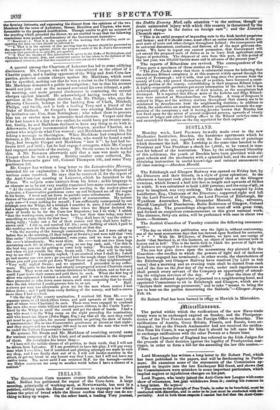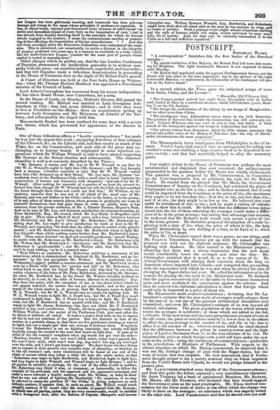111aistenantous.
The period within which the ratifications of the new Slave-trade treaty were to be exchanged expired on Sunday, and the Plenipoten- tiaries of the Five Powers met at the Foreign Office on Saturday. The ratifications of Austria, Great Britain, Prussia, and Russia, were ex- changed; but as the French Ambassador had not received the ratifica- tion from his Court, it was agreed that it should be left open for him to exchange ratifications with the other Powers at a future time.
The Lord Chancellor of England has referred to the Irish Judges for the grounds of their decision against the legality of Presbyterian mar- riages, in order to form a bill for the amending the law this session.— Times.
Lord Monteagle has written a long letter to Sir Robert Peel, which has been published in the papers, and will be forthcoming in Parlia- ment. He examines some of the statements of the Commission ap- pointed to inquire into the late Exchequer Bill fraud, and shows that the Commissioners were mistaken in some important particulars, which implied neglect or injudicious changes on his part.
Lord Nugent, who lately joined the Anti-Corn-law League with some show of reluctance, has just withdrawn from it ; stating his reasons in a long letter. He says= " The return to the principle of Free Trade, in order to be beneficial, must be conducted with discretion, and in order to be just must be conducted with im- partiality. And in both these respects I cannot but feel that the Anti-Corn- law League has been grievously wanting, and insomuch has done grievous damage and wrong to the cause whose principles it professes to represent. It has, in direct terms, rejected and denounced every. measure of relief except an entire and immediate repeal of every duty on the importation of corn '; and it has shrunk from frankly devoting itself to the principle for which its honour stands engaged to the country, I mean the commensurate sacrifice of protect- ing-duties affecting theimportation of foreign manufactures. • * And this not from oversight, since the Executive Committee were reminded of the omis- sion. This is calculated, not unnaturally, to excite a distrust in the integrity of purpose professed two years ago, in a manner so creditable to a body which, like the Anti-Corn-law League, consists for the most part of persons whose capital is vested in manufactures." Other charges which he prefers are, Shat the late London Conference of Deputies pronounced the landholders generally to be without sym- pathy with the poor,—an assertion indiscreet, ungrateful, and inaccurate ; and that 600 Deputies made a ridiculous demonstration in proceeding to the House of Commons door on the night of Sir Robert Peel's speech.
A Court of Directors was held at the East India House on Wednes- day ; when Mr. Thomas Herbert Maddock was appointed a Provisional member of the Council of India.
Lord Albert Conyngham has recovered from his recent indisposition. He has taken Bourn House, near Canterbury, for a term.
In the House of Lords, on Monday, Mitford's Divorce Bill passed the second reading. Mr. Mitford was married to Lady Georgians Ash- burnham in 1828: they had seven children ; and in 1838 they went to live at Frankfort-on-the-Maine : there an acquaintance sprung up between Lady Georgiana and Mr. Molyneux, an Attaché of the Em- bassy, and subsequently she eloped with him.
Maiemoiselle Rachel has been confined for some days with a severe sore throat, which has prevented her appearance at the theatre in Paris.
One of those ridiculous affairs a "hostile correspondence " has made its way into the papers this week ; occupying first three or four columns
of the Chronicle, &c. on the Liberal side, and then nearly as much of the Times, &c. on the Conservative, and each side of the press duly ex- changing, as in honour bound. It originated in some injurious ex- pressions which Sir William Wraxall is said to have uttered respecting Mr. Symons at the Stroud election and subsequently. The elaborate absurdity is well and concisely described by the Times- " Mr. Symons, it seems, sent Mr. Ley to Sir W. Wraxall to say that he (Sir W. L. Wraxall) ought to fight him (Mr. Symons); and Mr. Ley brought back a message (whether correctly or not) that Sir W. Wraxall ' would have him (Mr. Symons) up at Bow Street.' Mr. Ley says, Mr. Symons 'im- mediately went to the Parthenon Club, with .a small cane in hand' (admire the conjunction of honour and humanity with despatch) and asked for Sir W.
Wraxall. After waiting for upwards of a quarter of an hour the servant in- formed him that, though Sir W. Wraxall had not left the Club, he had searched the house through -three times and could not find him.' Sir William, on the contrary, assevers that he was not at all afraid of the small cane of Mr. Symons, and was not hidden in the Club—either in the larder, or in the pantry, or in any other of those remote places where persons in perplexity are wont to intrench themselves—but had gone home to write an epistle, more or less valorous, from his private residence, at No. 1, Chester Terrace, Regent's Park. And so he says to Mr. Ley, and demands satisfaction for misrepresentation, by Peter Borthwick, Esq., his second, which Mr. Ley thinks it altogether infra di,g, to give. Then come a flood of short notes and a long interview between Mr. Borthwick and Mr. Ley's 'friend,' Mr. Robertson; Mr. Borthwick in- sisting that Mr. Ley ought to give satisfaction by word or deed to Sir W. Wraxall, and expressing ' his fears that the affair must be settled at the pistol's month' ; and Mr. Robertson insisting that Mr. Borthwick wants to fight Mr. Ley himself—than which nothing seems further from Mr. Borthwick's inten- tion. Then comes forward an aged and venerable gentleman,' named Walton, to confer with Mr. Robertson as Mr. Borthwick's friend. Mr. Robertson tells Mr. Walton that Mr. Borthwick is ' chivalrous,' and Mr. Borthwick that Mr. Robertson is gentlemanlike' ; and Mr. Walton adds, that Mr. Borthwick can't be kept waiting, ' as he is a married man.' " Next follows an explosion : Mr. Robertson publishes a statement of his interviews, which is characterized as falsehood by Mr. Borthwick, and as in- accurate ' by the less precipitate Mr. Walton. These gentlemen (in our
Wednesday's paper) publish a counter-statement, and Mr. Borthwick sends a note by a friend with matter for ' powder and ball' to Mr. Robertson, who
writes back to say that his friend Mr. Cooper tells him that 'he can take no notice whatever of the letter of Mr. Peter Borthwick, delivered by Mr. Stewart; for what Mr. Borthwick has, by his friend Mr. Walton virtually declined to do directly, he is not, by the rules of honour, allowed to do indirectly.' Fur- ther than this point, with the exception of one or two short letters which do not appear material, the matter has not yet proceeded ; and so the general result of the whole matter is, at present, that Mr. Symons wants to fight Sir W. L. Wraxall ; but Sir W. L. Wraxall sees no reason for fighting him. Sir W. L. Wraxall wants to fight Mr. J. Peard Ley, but Mr. J. Peard Ley won't condescend to fight him. Mr. J. Peard Ley is ready to fight Mr. P. Borth- wick, but Mr. P. Borthwick has no quarrel with him ; and Mr. P. Borthwick wants to fight Mr. James Robertson, who does not think Mr. P. Borthwick entitled to any such satisfaction. Finally, all these parties, together with Mr.
William Walton, and the porter of the Parthenon Club, give each other the lie direct or indirect all round. It makes a man's head ache to try to master
all the in and out relations of the parties. But the abstract or sum of the matter, in a portable shape, is, that there are five gentlemen wanting or wanted to fight, but not a single pair that can arrange it between them. Everybody (except Mr. Robertson) is set on fighting somebody, but nobody will fight anybody except the second to the man that wants to fight him. It puts us in mind of the old woman's complaint when pig would not get over the stile- ' Butcher, butcher, kill cow, cow won't drink water, water won't quench fire, fire won't burn stick, stick won't beat dog, dog won't bite pig, pig won't get over the stile, and I shan't get home tonight.' We don't know whether things are to remain in their present very complex state of absurdity, or whether, as in the old woman's case, some contrivance will be found at one end of the chain of events which may infuse a little life into the whole series, so that 'Robertson may begin to fight Borthwick, and Borthwick begin to fight Ley,
and Ley begin to fight \Vraxall, and Wraxall begin to fight Symons '; and so all parties be satisfied, or perhaps, for the end of the affair is still in nubibus, Mr. Robertson may think it wise, or necessary, or honourable, to follow the example of his principal, and his opponent and his opponent's principal, and make a move towards a hostile meeting with Mr. Walton, in order to show that he was not afraid of fighting Mr. Borthwick. To ourselves, if we may be allowed to usurp the province of ' the Clubs,' in giving judgment on such delicate matters, it appears that, in such an event, Mr. Walton would much simplify matters if he would take the trouble to quarrel with Mr. Symons; in which case all parties, unless they are very unreasonable, would be satisfied with a hexagonal duel, after the fashion. of Captain Marryat's well-known triangular one. Walton, Symons, Wraxall, Ley, Borthwick, and Robertson, might have their shot all round each at the man he was anxious to wing, and no waste of powder. Such &piquant event might almost resuscitate duelling and the code of honour, which will really, unless enlivened by some novel folly, die of inanity. And, for that end, we earnestly recommend it to the Clubs as a full and sufficient expedient."



























 Previous page
Previous page